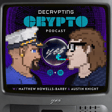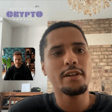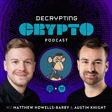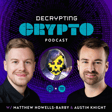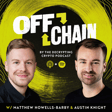Become a Creator today!Start creating today - Share your story with the world!
Start for free
00:00:00
00:00:01

Off Chain 7/27/23: Worldcoin - An Eye-Opening Discussion into Crypto's Most Controversial Project
In this week's episode we dig into the highly controversial Worldcoin project, uncovering the tech, token economics and issues is raises.
Transcript
Introduction to Decrypting Crypto Podcast
00:00:12
Speaker
Hello and welcome to the Decrypting Crypto Podcast. It's July 27th, 2023, and this is Off Chain, your weekly recap of the biggest stories in Web3. I'm Matthew Housebarbie, and as always, I'm here with Austin Knight. How are you doing, Austin?
Twitter's Rebranding: Confusion and Frustration
00:00:27
Speaker
I'm doing well, Matt. Trying to navigate my way around this rebrand of Twitter into acts. How weird. It's just, what are we even doing anymore? It just doesn't make sense to me.
00:00:45
Speaker
Yeah, it's been a weird one. The only thing worse than the rebrand is the endless stream of Twitter threads from random quote unquote influencers talking about their analysis of the migration. It's just like Jesus.
Aliens vs. Crypto: A Light-hearted Exchange
00:01:02
Speaker
Matt, I have a much better way for you to spend your time and that is to watch the congressional hearings on aliens.
00:01:13
Speaker
Did you see my tweet yesterday? Oh yeah, that was classic. I literally, I walked into, for anyone listening, I walked in, I'd just been in a few meetings, come out, walk into like my front room, there was like going into the kitchen to grab some more, my wife just turns to me, she says,
00:01:31
Speaker
I think aliens are real. I'm just like, Laura, I just, this is not the right time or place ever for that sentence. So I'm just gonna leave and just walked off. Yeah, no, it's just life is getting stranger, isn't it?
00:01:48
Speaker
And I will say I don't have an opinion necessarily either way on aliens. It's certainly not pro-alien at this stage. I just don't even want to be in the conversation. I don't want it to be that this is the primary conversation that's happening at the moment is aliens exist.
00:02:07
Speaker
Now, here's the thing, Matt, in defense of Laura, she has probably walked in on you over a hundred times and heard something to the effect of, hey, check out this thing called Goblin Town. It's very true, very true. Crypto is effectively extraterrestrial in that respect. But yeah, gosh, I don't know. Well, I mean, speaking of
00:02:33
Speaker
the future.
Introducing Worldcoin: What is it About?
00:02:34
Speaker
Speaking of things seemingly out of this world, we've got a bit of a, I hate to use this, but a bit of an eye opening episode today where we're going to be discussing the dystopian future that we're walking into where we all get our irises scanned in exchange for receiving a small gesture of cryptocurrency. This is of course the world coin project, which
00:03:00
Speaker
I'm not sure how many of our listeners have been following this. If you're even remotely on crypto Twitter, I'm sure you have heard some of this. This is the project company that one of the co-founders, Sam Altman of OpenAI, chat GPT creators, is also co-founder of Wildcoin. We're gonna dedicate this episode to digging in and uncovering a load of information about
00:03:29
Speaker
What the hell is going on here? What is Wildcoin? We're going to talk a bit about the tech, some of its implications. And then we're also going to dig into the token, which is in its own right, a major point of discussion. We're going to talk through some of the implications and what our take is on what is probably becoming the most controversial crypto project in a long time.
00:03:58
Speaker
So why don't we dive right in?
Worldcoin's Ambitious Mission and Financial Network
00:04:00
Speaker
Let's do it. Picture this. You're in.
00:04:16
Speaker
Colombia. You are in a queue of hundreds of people stretching round various buildings while you wait to walk into a strange room that kind of smells a bit sweaty. It's because there's been a lot of people in it that day and you peer into this strange orb to have your iris scanned simply to get a little ID
00:04:44
Speaker
that means you can receive some potentially worthless tokens every day for the rest of your life. Isn't that a future you wanna live in, Austin? Isn't it just? Well, this- You just wrote a Black Mirror episode, Matt.
00:04:59
Speaker
I mean, to be honest, there is an enormous Venn diagram, I think post 2020 of Black Mirror episodes and real world. And I think we've been living in that intersect for a while now. But what we're going to talk about in our own little mini Black Mirror today is wild coin. And this is very much real. Please do not take anything that we're saying as sarcasm or humor. This is very real and is happening right now. So
The Technology Behind Worldcoin: Orbs and Privacy Concerns
00:05:28
Speaker
Let's talk about Wildcoin. It is a project with a lot of funding, hundreds of millions of funding, and backed by, I mean, of course, it's backed by A16Z, and the rest of the big VCs in the world. It's, I quote, founded with the mission of creating a globally inclusive identity and financial network owned by the majority of humanity.
00:05:58
Speaker
Sounds pretty good so far. I like it. If successful, Worldcoin could considerably increase economic opportunity, scale a reliable solution for distinguishing humans from AI. Okay, I like that. While preserving privacy, hmm, dubious, but you know, I like that that's the emphasis, and enable a global democratic process, highly unlikely, and show a potential path to
00:06:28
Speaker
an AI funded UBI, universal basic income. So what we've basically got here is one mission that encapsulates probably 10 different in their own right, Herculean global missions in one. So why don't we talk about how Wildcoin is achieving or trying to achieve
00:06:55
Speaker
these pretty lofty goals. I think probably the best place that we start is by digging into the tech. Right. So let's talk about that. We mentioned orbs effectively at the center of world coin is an orb that scans your iris at a very high resolution using some proprietary tech that they've built. So this is how they create what they're calling proof of
00:07:21
Speaker
personhood. There's a white paper that they released. We can link to it in the description if you're curious to take a look at it that basically describes how they take this step to verify your identity and determine whether you're a real and unique person and not an AI, for example.
00:07:42
Speaker
So what we're talking about here is Matt was describing this room that people can go into. You've probably seen, if you've been following this, tweets of lines going around the block of people lining up to go to these rooms where there is a ball, basically. It's like a silverish, whitish ball, maybe about the size of your head.
00:08:05
Speaker
It's hard to describe, but anyway, this ball has a giant wide angle camera lens on it and you look into it and it scans your iris and then determines your personhood. And then once that has happened, you will receive what is called a world ID.
Worldcoin World App: Decentralization in Question
00:08:25
Speaker
So this is basically
00:08:26
Speaker
your digital passport. Now it's important to note that this isn't KYC. They're not really collecting any additional PII, personally identifiable information here.
00:08:39
Speaker
Um, it's, it's just a, uh, a determination or proof of your unique personhood. Um, this is the interesting piece, right? Because, you know, we've talked in the past, I remember in 2017, 2018, we talked a lot about all of the various projects that were spun up to create this idea of like a decentralized identity protocol. Um, and there were so many.
00:09:05
Speaker
of them out there right now but a lot of it is about you know verifying your identity and i think this this kind of this notion let's just park the whole like scanning your iris for for now
00:09:21
Speaker
This actually isn't really about verifying identity. It's kind of verifying your humanity, right? Like it's one step prior to that. And it's more a sign of the times, I think, than anything that we even need to begin doing this. I will say for what it's worth, the fact that Sam Altman, OpenAI co-founder is also behind this project,
00:09:46
Speaker
is probably gives you an inclination of like the fact that this is a real problem that is going to become a bigger problem regardless of how you feel about this project, right? Like the problem that's being solved around verifying quote unquote personhood or proof of kind of humanity, right? It is absolutely going to be an acute need that we have over the coming five to 10 years. It is. It's true.
00:10:13
Speaker
And, you know, that may be a little bit unintuitive now, but you probably have interacted with some form of media that, you know, was made by AI, obviously deep fakes being one of the most obvious examples of those. And I think that that's going to increasingly be a problem. You know, also having things like
00:10:35
Speaker
Twitter accounts, social media accounts, et cetera, that are run entirely by AI, not being able to distinguish the difference between them. I think that these are all attempts at that. Anyway, once you have your world ID, you'll be able to log into the world coin world app and you'll start receiving a daily allowance of world tokens, WLD tokens. We'll talk more about that later.
Orb Operators: Pyramid Scheme or Opportunity?
00:11:01
Speaker
But that is sort of this first step
00:11:04
Speaker
Uh, on the path to the rewards and incentives behind why somebody would get a world ID, but also on the path toward UBI, uh, which Sam Altman was, was describing in that quote that Matt read above, uh, earlier in the podcast. Um, okay. So now you have logged into the world app and you've got your daily allowance of world tokens. Uh, what's happening behind the scenes? So.
00:11:32
Speaker
your information is encrypted and stored on chain using ZK proofs. So the idea is that the information should be secure. We'll dig more into the limitations of that later and some of the concerns around it as well. But the point that's being made by the team is your information is stored on chain. It's encrypted. It's safe. With that said, still,
00:12:02
Speaker
The team is ramping up the distribution of orbs, right? So it's actually still pretty hard to find an orb to scan your iris and to get a world ID. There aren't very many orbs available right now. There is an application that you can fill out to become an orb operator where they will interview you, they'll provide training, and then I'll actually ship you an orb and you'll be compensated and world tokens for every new person
Challenges in Iris Scanning Technology
00:12:30
Speaker
that you onboard or basically each new iris that you get. It's, you know, this is like pyramid scheme 101, right? Yeah, that's exactly what I thought. It just feels like, you know, I get it. This is kind of their growth loop that they're trying to kind of build out with with this. There is one thing that I thought was very interesting listening to
00:12:52
Speaker
an interview with the Wildcoin team, and in particular, the CEO. And, ah, man, I am forgetting the CEO's name right now. But either way, he's a technical kind of founder. And they were talking a bit about these orbs. And they completely bespoke built these orbs and the cameras behind them. And one of the big things they were talking about in this, and why the supply chain is very hard. I've been working on this for years now.
00:13:22
Speaker
But there's lots of different ways that you can prove uniqueness. People usually think about stuff like fingerprints, right? But actually at a global level, fingerprints are not actually that unique. And that's why a lot of the time like fingerprinting is looked at on like a country level. And even then it's not perfect. I think one of the most
00:13:51
Speaker
unique elements of a human is their gait, actually, the way they walk. But that presents some challenges. If you've got injuries and stuff, your gait can change stuff like that. So I think they were looking when they were talking about this, it may be like palms, but it's not that possible. And actually, irises are
00:14:09
Speaker
probably the best fit for what they're trying to achieve. That said, if you want to scan someone's iris and at a global level, bear in mind, you're going to have to capture the uniqueness of every single iris. The resolution of these cameras to capture the absolute nuance of every single iris to truly get this uniqueness is
00:14:34
Speaker
very, very high, very high. And so they've had to build these very technically sophisticated orbs. And I think this is like one of the blockers, but I think it's interesting.
Trust and Privacy: Worldcoin's Motives Examined
00:14:47
Speaker
I know we're going to talk a little bit about this, but they kind of said, look, the orb is the starting point. We'll have these orb operators that are going to be compensated to get new people in. But what I thought was very interesting is they were saying how
00:15:00
Speaker
But we see in the future, this is all open source. Other hardware can connect into it. I was just like, how do you kind of maintain the control and quality and things like that if new tech can be integrated in? Maybe they've got plans for this. But I thought it was an interesting little wrinkle that in all of this that could play out. Oh, yeah, absolutely. I think that is certainly a concern.
00:15:26
Speaker
Um, to your point, yeah, they are claiming that most of the tech is open source and that they have plans to fully open source the tech, which sounds oddly familiar to me. It sounds like a little company called open AI that started as a, as an open source nonprofit, trying to prevent, uh, you know, destruction or risk from AI and then became a closed source for profit, a pusher of AI right at the forefront of AI. Um, and, and, you know, maybe, um,
00:15:55
Speaker
the entity that is propelling us the furthest and fastest toward this brave new world with AI, right? So I don't trust or believe any of that shit for a second. They also have mentioned to your point, Matt, that they're going to be enabling the integration of other iris scanning hardware into the protocol in the future, which to me is
00:16:20
Speaker
kind of in direct conflict with their claims around privacy and security and encryption and end-to-end control over the hardware and the software. At the same time, the project claims to be fully decentralized. And I think you have to ask yourself, is this really the case with the distribution of tokens and the power that grants in governance? And we'll talk more about that
00:16:50
Speaker
Uh, shortly. Um, but to me, you know, I, I do think that there is, you have to admit like there's some really interesting stuff here in terms of the hardware and the grand ambition.
00:17:05
Speaker
of the project, right? I completely agree. There's a lot wrapped up here and I've tried to remain very objective in thinking through wild coin. And I'll actually be honest, this will probably come to life as we discuss.
00:17:22
Speaker
I'm kind of still undecided on exactly how I feel about this because when, and I think when we get, we'll break down some additional parts to this, which sway us in different directions, but at an objective level, when you think about the problem they're trying to solve,
00:17:42
Speaker
Objectively, this is a, and almost like categorically, the problem, if we take away the whole UBI and everything like that, but the problem around verification of like humanity of personhood, it's a need. It's a need that is going to grow and grow and grow. This isn't just about purely like AI, but as we become
00:18:04
Speaker
more and more digitally native, as weird as that is to say that in this day and age, as more of our financial lives become digital. I think CBDC is something that, you know, me and you also, we talk about a lot and digging a lot into this. But when we think about getting to the level of like, when CBDCs come out and we need, everyone has a digital wallet and, you know, how do you,
00:18:34
Speaker
How do you get to a level where you can...
00:18:38
Speaker
avoid civil attacks, right? So like one person holding multiple wallets, multiple bank accounts in this respect, without just having to enforce tons of identity verification. There's a lot of problems that come in actually verifying your identity, right? Bear in mind, this is not proof of like, are you a person? This is having official documentation, which often is not
00:19:06
Speaker
like possible when you are homeless, underprivileged in areas of like socioeconomic, like poor backgrounds, like people don't have passports, people don't have driving licenses, people don't have official government IDs in many cases. This isn't because they're illegal immigrants. This is something that is an acute problem in lower income and underprivileged groups where typically like either of those documents cost a lot
00:19:33
Speaker
or require a permanent place of residence, or a job, or the ability to pay for driving lessons. These kind of things, right? And it's like, OK, well, if we can get to a level where we just prove humanity, can that be enough? And so I think there's elements here. And I'm getting a little off tangent, but I just want to call out, I think there is a problem that's trying to be solved. And the tech is fascinating, right? It wraps up everything together.
00:20:01
Speaker
The conundrum that I think we face in trusting all of this is, and I will go back to the interview that I was listening to with the OpenAI team that included Sam Altman on there, and they were kind of talking about, there was this moment in the interview and they're like,
00:20:18
Speaker
Yeah, you know, like for all of, for the majority of us, this was our first job out of university. None of us have worked in like big companies. So we were, we're figuring stuff out like a few years ago and now we feel like we're a really high performing team. And I was just like, holy shit. Like this, the fate of what is an incredibly sensitive
00:20:41
Speaker
honeypot of information is in the hands of people that objectively don't have an enormous amount of experience doing something of this scale. And I was just a bit like, oh, okay. So I think it's more questioning the motives versus the technology and the solution that I'm grappling with
Worldcoin Token Launch: Economics and Risks
00:21:00
Speaker
right now. Interesting. Yeah. Well, what about the token then?
00:21:05
Speaker
This is where we get into the motives. And this is where, for all of my optimism around the problem being solved, the tech, it starts to sour on me. So let's dig in and analyze the wild coin token.
00:21:27
Speaker
So they've launched their token on Ethereum Mainnet and now on Optimism, which is the layer 2 roll-up chain to Ethereum. And it seems as though they're going to be building a chain on the the OP on the Optimism stack, similar to how, as we've talked in previous episodes, the Coinbase is building their own standalone layer 2 on the OP stack called Base.
00:21:46
Speaker
Right now, though, they just launched their token. And that's what optimisms mean that I was I was digging into the token economics, I was looking at liquidity and what's been happening since the launch. And it's actually already on a lot of the
00:22:03
Speaker
larger exchanges that typically list things pretty quickly. The Huobi's, the Binance's, OKX, et cetera, they're already there. And I think on its opening day, it saw nearly $200 million of 24-hour volume. In the past 24 hours, it's $152 million in volume. That's a lot, by the way.
00:22:22
Speaker
That is a lot. Its market cap sits at 250 million dollars, which makes it around about 136 largest token by market cap. That's according to CoinGecko, pretty reasonable region. So top 150 token by market cap for sure.
00:22:41
Speaker
So I was digging into the Block Explorer for Optimism. There's a little under 250,000 unique holders on Optimism as of today. That in itself is kind of interesting, right? Because Sam Altman and co have been saying that they've got millions of people with world IDs and
00:23:07
Speaker
I was expecting a lot more unique token holders as a result of that because they can start claiming their tokens. I did a little digging into this and I think, well, I don't know all the technicalities right now, but I think you can basically create your account and you don't need to like actually take things on chain just yet. So that's probably why. But here's, so, okay. So it all kind of sounds somewhat normal right now.
00:23:32
Speaker
Here's where things like we get into the brass tacks and where things start, you start to see what's happening under the hood. Total supply of $10 billion. It's quite a large supply because it puts the fully diluted valuation at $23 billion.
00:23:49
Speaker
when all of the tokens are in circulation and released at the current price it would be a 23 billion fdv which i'm pretty sure that would put it as like a top five token let me just uh let's get um coin gecko up just see would it put them in the top five that show fdv uh
00:24:14
Speaker
Top 10. It would actually be the sixth largest. So it wasn't too far off. So you can kind of see the scale that it's at in terms of the fully-tolerated valuation. So massive, massive FTV. That said, I'll dig into the circulating supply in a second. The supply remains fixed for 15 years.
00:24:42
Speaker
after that, and this is all baked into the white paper, the smart contract. After that,
00:24:47
Speaker
Token holders can vote through governance vote to decide on adding an inflation rate of 1.5%. So the supply increases. Why, you might ask? Well, that's because only 143 million, bear in mind, it's a 10 billion total supply. Only 143 million tokens have been launched into the circulating supply at launch. A very, very tiny amount of the supply.
00:25:17
Speaker
Over the next 15 years, the rest of the supply will be fully into circulation. And at that point, if they want to keep air dropping to people, well, they might need to print some more, for example. Now, here's the first big red flag. Whenever we see a massive total supply and only a small fraction of that being unlocked to begin with, there is just
00:25:46
Speaker
consistent unlocks of tokens, sell-offs and bleeding. It's just like continuous inflation. And more importantly, near the beginning, if there is a crunch in supply, which there is, not a ton of liquidity,
00:26:02
Speaker
And a big chunk of early investors maybe get to unlock a load of their tokens early on. Well, we kind of know what happens. And I think there's been a lot of criticism around the launch because the token pumped pretty hard right after the launch. I think within the first 24 hours, it was up.
00:26:22
Speaker
pretty significantly and then crashed 40% in value in the following 24 hours. So you can kind of see that someone's been dumped on basically here and it's a shocker retail. It's since rallied, it's still down around 10, 15%. But so why is this happening, right?
00:26:49
Speaker
Here's the big problem. Of the token circulating supply today, 43 million of that 143 million was set aside for early users. And 100 million were loaned to five major market makers outside the US.
00:27:09
Speaker
These loans have a duration of three months. And at the end of the three months, the market makers have the option to either purchase the WLD tokens or they can return the loan.
00:27:24
Speaker
So basically, these market makers just have a free ride of trading and making a ton of gains on these tokens. And this is where the lion's share of all the trading activity is from, by the way, just market makers trading with themselves. And when you look at the white paper, they pulled out this little formula. And if we just assume
00:27:47
Speaker
that the 100 million tokens were distributed evenly across the five market makers. And I'll call out, we don't actually know that, but it probably is the case, even reasonably to think that. The purchase price that the market makers would have as an option to buy at the end of these three months would be $2.80. I think right now, we're sitting at like $2.24.
00:28:14
Speaker
So this basically means if demand is low, market makers control the liquidity. They can just drop that price down by selling a bunch to themselves. And then they could just buy them back at a lower price. If they stabilize that price around about $2.80, it doesn't make sense to return the loans. And they just buy tokens on the open market. So it's basically just a win-win for the market makers. And they're just playing with retail funds continuously.
00:28:42
Speaker
And once that three-month loan period is up, what I would expect is liquidity to dry up a fair bit because these market makers, they won't have the incentive to support it after that. And if you go on top of that, almost 10% of the overall supply is allocated to early investors, such as, you guessed it, A16Z, who actually led that last round, and all of the others.
00:29:07
Speaker
And 5% of the initial token supply is unlocked at the initial token generation event. So a big chunk of this is just early investors, market makers dumping on retail, as we always see. If that wasn't worse, a big chunk, and this will be like something that they will shout about as being a good thing.
00:29:33
Speaker
75% of the total supply, which will be distributed over the next 15 years, is allocated to the community. This is the UBI they're talking about, which is just like, it's not really UBI. This is just them air dropping tokens continuously to their world ID holders. What are people gonna do when they keep getting these daily air drops? We've seen this time and time and time again.
00:30:01
Speaker
You get airdrop tokens that you have no real use for, you convert them into USDC or USDT, and you cause a downward spiral in price. All these people thinking that they're getting in early, total wild coin, they're just going to watch this slow bleed of cell pressure, just crumbling down, pushing price lower and lower and lower.
00:30:24
Speaker
After they've already been dumped on now this this is me speculating based on pretty much the playbook I've seen happen time and time again in all of this and I just remain incredibly skeptical. Around this whole kind of motion I mean this is just.
00:30:44
Speaker
glorified Ponzi scheme to get people to scan that irises and I get that you need to incentivise people but you know when you've got people speculating and
00:30:56
Speaker
putting their livelihood on the line in many cases here, it just leaves a real sour taste in my mouth. So I think this for me is my biggest area of criticism is just like this token aspect. And it's just yet another example of where tokens are being used in a detrimental way. And I just don't believe it's even needed in this project. Yeah.
00:31:22
Speaker
I think you're onto something there, Matt, and I think that your point around these tokens are being used to incentivize people to scan their irises is really well put. And it's focusing the conversation back on maybe the core motives behind the project. And then you have to ask yourself, well, why might someone want to incentivize people, the global world population, as ambitious as this project is, to hand over a scan of their iris?
00:31:51
Speaker
Obviously, the answer to that could be completely benign, or it could be really dangerous, depending on which angle you take.
Vitalik's Concerns: Privacy and Security in Worldcoin
00:32:02
Speaker
So let's talk about how we feel about this whole thing. I think that there have been a lot of concerns floating around about it. And this is a good opportunity for us to break down those concerns and dig into what might be a legit concern versus what might be just a little bit of fear mongering.
00:32:24
Speaker
So Vitalik put out a blog post a few days ago where he outlined four concerns that I think are mostly representative of the broad concerns that have been floating around. There are a few more that we can dig into after this, but I just kind of wanted to go through his points because I think, you know, he provides a really detailed
00:32:53
Speaker
and reasoned perspective given the role that he's played in the industry for so many years. And basically in this blog post, the four concerns that he laid out were concerns around privacy, accessibility, centralization, and security. So let's start with privacy to begin with. The point that he makes here is that the registry of iris scans could reveal
00:33:21
Speaker
information, right? At the very least, if somebody else scans your iris, they would be able to check it against a database to determine whether or not you have a world ID. But potentially, beyond that, iris scans could reveal more information, including a person's sex, their ethnicity, maybe even certain medical conditions. So yes, while WorldCoin claims that they're not collecting PII, personally identifiable information, and thus the KYC process that we were talking about,
00:33:51
Speaker
it does go a little bit deeper than just collecting an iris. And I think that, you know, it would behoove us to not underestimate the importance of an iris scan and the amount of information that can be contained within. Yeah. And, you know, I actually hadn't even really thought about that, but it makes a lot of sense in that respect as well. I think also the fact of being able to
00:34:20
Speaker
match against kind of a database to see if you have a wild ID is also an enormous piece in all this, kind of like the encrypted email discussion, right? It's like every email using SHA-256 encryption, like once you encrypt an email or a password,
00:34:44
Speaker
that same email address, its encryption key on the public level remains the same. So if you have that in one database and you can still match the encryption keys together to work backwards to see if someone's email address is in a database. So there's elements here. I think there's also the big piece that we're going to talk about here on the accessibility
00:35:07
Speaker
side as well, right, where world ideas, this is what Vitalik was talking about, they're not going to be reliably accessible unless there are so many orbs that anyone in the world can easily get to one. We kind of touched a little bit on this. It would be hard, quote, it would be hard to get to a world where there's an orb within five kilometers of everyone.
00:35:31
Speaker
And I don't even know, Austin, if that is a world I want to live with. So it's a good point from Vitalik. But the latest estimates is that 1,500 to 2,000 orbs will be available in 35 global cities this year. The total number of weekly registrations to ramp up from 40,000 people a week to 200,000.
00:35:55
Speaker
And wild coin is coming from wild coin, right, estimates that two million people have already signed up for a world ID. And the goal is to get up to two billion, which is a huge goal. But which is a very important point is there's nothing to stop a government from banning orbs in their country or using this technology to coerce citizens. I think that that is a key
00:36:22
Speaker
piece and for all the decentralized efforts like what's to stop Sam Altman and co-getting subpoenaed and you know what do they do then. I think one thing as well that Vitalik doesn't mention here that I was thinking about a little bit before that's related to accessibility
00:36:40
Speaker
You know, what happens if you lose or damage your eye? You know, there's other pieces here, right? So it's like, you know, anyone with like disabilities or if you have a glass eye, which like I myself anecdotally know, like more than a handful of people with a glass eye. Like what happens there? So I think it's like inclusivity pieces as well. Yeah.
00:37:08
Speaker
Which you would think, you know, if you're building a network of IDs that is the size of the world, there are going to be complications like that. That's actually a really interesting point, Matt. I mean, I have to imagine they've thought about that and I wonder what the sort of fallback would be for a case like that. I mean, it's not a trivial amount of people.
00:37:30
Speaker
that are gonna be dealing with something like that. Well, and even if you think about, okay, you don't have, you still have your eye, what about if you have glaucoma? Can you scan an iris if you have glaucoma? Probably not. And I'm pretty sure the stats on the amount of people with glaucoma in the global population will be pretty high. How's she gonna check that while you're going through some of the other pieces? Yeah, and I mean, ironically, glaucoma is going to be, and the other injuries and disabilities that you mentioned
00:38:00
Speaker
are going to be especially common in the unbanked and underbanked or underserved areas of the globe that this project at least claims to be especially targeting, right? 100%. And by the way, that number is 80 million. They expect it to go up to 111 million by 2040 with glaucoma.
00:38:20
Speaker
I would like this project better if they said, oh, well, we'll fix your glaucoma. We'll have a. If I get the tokens, fix my eye. Maybe they'll create tiny little orbs that you can replace your eye with and you can go around and like terminate a style, scan people every time you look at them. Wouldn't that be wonderful? Wouldn't that be great? Yes. Okay. So there was a third concern that Vitalik mentioned, which was centralization.
Hardware Centralization and Identity Risks
00:38:50
Speaker
Remember, the orb is a hardware device. And with hardware devices, we really have no way to verify whether it was constructed correctly and does not have backdoors. It's just extremely difficult to do that. And, you know, the team at Worldcoin, they're not, as we mentioned earlier, they're not planning to manufacture 100 percent of
00:39:14
Speaker
their orbs in-house or anything like that. They don't have end-to-end control over their supply chain, as far as I understand. They will be using third-party manufacturers that are distributed around the globe. Now, of course, this is not an uncommon practice in hardware manufacturing and engineering. Your iPhone was not literally manufactured by Apple, but it does introduce risk, especially when you're dealing with
00:39:43
Speaker
multiple different manufacturers, and you're talking about something where security is so, so important, and it's going to be difficult to verify whether or not there are backdoors. And with that said, even if the software layer is perfect and fully decentralized, the World Coin Foundation still is going to have the ability to insert a backdoor into the system, letting it create arbitrarily many fake human identities. And that's basically the core of what I would say is Vitalik's
00:40:12
Speaker
concern here. He said, quote, even if even one or manufacturer is malicious or hacked, it can generate an unlimited number of fake iris scan hashes and give them world IDs. So what he's concerned about here is like the sort of proliferation of fake IDs, which kind of destroys the whole purpose of the project, right? Proof of personhood needs to be trustworthy. And if you can create
00:40:39
Speaker
fake proof of personhood, then there's really no point in having proof of personhood in the first place. I think that this does miss some additional concerns around centralization, particularly around attack vectors for governments or malicious actors that might want access to this data. Agreed. Yeah. And so if you think about it,
00:41:04
Speaker
To me, we'll dig into security, Vitalik's fourth concern next. But I think that the main points that he makes, yes, accessibility is very interesting. To me, that seems like more of a practical sort of scaling concern, which I think, you know, with enough money, which this project certainly has a lot of, and will,
Government Misuse and Biometric Data Control Risks
00:41:25
Speaker
Um, that could be overcome, but privacy security and centralization risks, those are somewhat inherent to the architecture of the project. Think about it. Many governments would pay a lot of money for an iris scan of most of their citizens, which means that there are going to be incredibly high incentives for hacking. And it's nearly impossible to find backdoors in hardware.
00:41:53
Speaker
So having this level of information, a literal digital biometric passport, a scan of the irises of what they're aiming for, billions of people across the globe, being managed by one corporate centralized entity to me is an incredible risk and attack vector. And I don't like it.
00:42:13
Speaker
I completely agree with you and you know I think it's worth us calling out as well at this point it's easy for us to sit here and pick apart a project that has such lofty goals because actually a lot of the things that we're discussing
00:42:32
Speaker
Yep, they apply to wild coin, but actually many of these challenges are faced by pretty much anyone that wants to solve kind of like the proof of personhood piece. You know, like the security kind of side of things, you know, Vitalik was talking about how a user's phone could be hacked. They could be coerced into scanning their irises while showing a public key that belongs to someone else, 3D printing fake people, et cetera, et cetera.
00:42:58
Speaker
This is a fundamental problem. And it's why actually the wider umbrella of identity verification that I'll bucket this as one piece of that in is so, so challenging to solve. Does that mean that we should stand by and accept and let this single entity go and try and figure this out?
00:43:25
Speaker
I don't think so. You know, you let the genie out of the bottle here, it's no putting them back in. And this is a really delicate matter. And regardless of whether you believe the world coin team to be moral, upstanding, attentive, like dedicated team that is
00:43:49
Speaker
is completely focused on their mission and is doing everything possible to predict the privacy and security of their users, which I'll go on record saying, I have no reason to believe why that isn't the case, just to be clear. I just think it is unbelievably difficult to stop some of these attack vectors from coming into play.
00:44:14
Speaker
So I think this is really challenging. It's problematic on a lot of levels. I think there is enormous incentives at this kind of scale to really think about how you could capture this data and sell it to malicious actors. And I think, you know, at any kind of scale that this creates, that will be an issue. Yeah.
00:44:43
Speaker
I think you're right. And the thing is, Matt, if the UN were doing this, or if the Chinese government were doing this, or the US government were doing this, this would be like huge red alert. Do not pass go.
00:44:59
Speaker
collect $200, like shut that down, you know? Austin, if we've learned anything, we always trust tech bros. I mean, that's, that's basically where I was going with this, right? Like why, why would we trust a huge tech entity? And I do, I will say like, I have an enormous amount of respect and admiration for Sam Altman and many of the people that are working mind this. I mean, the, the, you know, the, the rise in entrepreneurship, um, you know,
00:45:29
Speaker
from YC to open AI to now this, it's amazing, right? Like all of that aside, however, I think we have seen time and time again that there is incredible collusion between big tech, large tech entities and governments, corporations and government, which also is a core tenant of fascism, by the way. People don't like to talk about that, but it's the truth.
00:45:55
Speaker
And I think that that's happening more now, at least in the US, but maybe even in the Western world than it has in, at least in my lifetime, if not in history. I don't see any reason why we would distinguish a private corporation like Worldcoin doing something like this.
00:46:18
Speaker
and the risks associated with that from the risks associated with a government entity doing something like this. To me, it's one and the same, it's equally dangerous. To your point, even under existing legal structures, Worldcoin could be subpoenaed. But I think, especially over the past couple of years, we've seen time and time again that the existing legal structures are kind of being ignored. And the value of this information is so high. It's way, way higher.
00:46:48
Speaker
than the value of information that so many existing tech companies have. I think that even in our existing paradigm with Google and Meta and Microsoft and all of these companies and the challenges that we've seen around privacy and security there, this is taking it to a whole other level. And you know, Matt, we were talking about
Worldcoin's Success: Skepticism and Future Challenges
00:47:12
Speaker
the
00:47:32
Speaker
you know, predicting 10 years ahead, the future with AI, like a need and everything like that. But it just doesn't feel necessary to me at this point, to be perfectly honest. And maybe that's where part of the skepticism is coming from.
00:47:45
Speaker
Yeah, I don't think that we have felt the effects of the need for this right now. In the same sense that I think 10 years ago, I don't think we really understood the need for certain levels of privacy and decentralization in our life right now, more so from the grips of large tech and more so ad tech. But I believe this will become
00:48:13
Speaker
a very well understood problem. I think we're far away from that right now. I think the somewhat ironic element of this is Sam Altman has almost created product market fit for this product by introducing his open AI product to create the very problem that they're trying to solve. So, you know, there's some real entrepreneurship shown there. But jokes to one side, I think that
00:48:41
Speaker
This, for all of its critics, for all of its plaudits, was always going to be a very divisive and controversial project.
00:48:53
Speaker
I, for one, am incredibly skeptical that it will be able to succeed in even any of its missions. I think that the UBI angle is absolute nonsense. And I think that their token economics basically put page to that.
00:49:14
Speaker
I'm very skeptical that people at scale will flock to the orb, especially once the incentive that they're being waived in front of them is somewhat worthless, being the token. And like in all projects like this, which I think we're yet to see happen so far with AI, but will almost certainly happen, is the first time something really goes wrong.
00:49:41
Speaker
things will really go wrong. And I think people will kind of get wise to that. I'll kind of pull a kin to the Cambridge Analytica scandal being a landmark moment in data privacy and ad tech and really opening the world's eyes to what can go wrong. And I think there'll be a Cambridge Analytica moment in AI very soon that we face, which may further fuel the need for something like this. But I think also,
00:50:10
Speaker
this area will have its own issues. But I would, I'll say we're at time now, so we're gonna wrap things up. I would love...
00:50:20
Speaker
If any of you that are listening to this podcast have had your iris scanned through Wildcoin, have opinions, please tweet us. I would love to hear about the process and what you're kind of thinking around it is. I genuinely would love to and love to better understand and have a good conversation about what the experience was like, because I'm actually just generally very curious and fascinated about it.
00:50:44
Speaker
But until then, Austin, we'll go get our irises scanned and I'll see you in our dystopian future next week. Talk to you then, Matt.
00:51:14
Speaker
The contents of the Decrypting Crypto podcast should not be used and are not intended as investment advice. Please do your own due diligence before making any investment, cryptocurrency or otherwise.
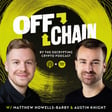
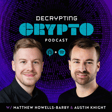
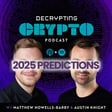
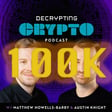
![CBDCs: The [Dark] Future of Money (Part 2 of 2) image](https://media.zencastr.com/cdn-cgi/image/width=112,quality=85/image-files/61fc0461fb20e00040aeb09e/5b9f1396-2a8e-418d-82a0-30fd00969266.jpg)

